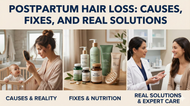Postpartum Hair Loss: Causes, Fixes, and Real Solutions
Posted by xandrox on 27th Nov 2025
Postpartum hair loss is one of the most common concerns new mothers face. Many notice more hair in the shower, on the pillow, or on the brush months after giving birth. As a hair health expert, I can confirm this concern is normal and predictable. The key is to understand why it happens and what steps support healthy regrowth.
This guide explains the triggers, the timeline, and proven solutions that support a strong and steady recovery.
What Causes Postpartum Hair Loss
Hormonal changes
During pregnancy, high hormone levels keep most hair in a long growth phase. After birth, those levels fall. This shift pushes many hairs into a shedding phase at the same time. This is the main cause of postpartum hair loss.
Stress and disrupted sleep
New mothers often face stress and broken sleep. Both slow hair cycles and increased shedding. To learn more about how stress affects hair, review our full guide on stress and hair loss.
Low iron and low nutrients
Iron levels can drop after birth. Low iron slows new growth. Low protein or low vitamins can also affect hair roots and hair strength.
Scalp changes
Hormone shifts can change scalp oil levels. Some mothers notice dryness while others notice excess oil. Both changes can influence shedding patterns.
When Postpartum Hair Loss Starts
Most women begin to notice shedding two to four months after birth. Some notice it sooner, some later. Even heavy shedding in this phase is normal.
How Long Does Postpartum Hair Loss Last
Postpartum shedding often lasts three to six months. Some women see it for up to twelve months. Once hormone levels settle, hair growth usually returns to its normal rate.
If shedding stays strong past a year, you may benefit from a full check of iron, thyroid function, and other health markers.
Real Solutions for Postpartum Hair Loss
Use gentle scalp care.
A gentle shampoo and light conditioner support scalp health. Clean and calm scalp skin helps roots work better.
Add nutrient-rich food
Hair needs protein, iron, zinc, and vitamins. Simple foods like eggs, fish, beans, leafy greens, and nuts can support strong regrowth.
Consider topical support
Some postpartum women use minoxidil to support new growth. Always speak with a medical professional first, especially if nursing.
Lower stress
Short breaks, light movement, and mindful breathing lower stress levels. Lower stress supports healthy hair cycles. Learn more about the stress link in our expert guide on stress and hair loss.
Support sleep
Even short rest periods help. Good sleep supports root repair and new growth.
Avoid harsh tools and styles.
Skip strong heat tools, tight styles, and heavy brushing. Gentle care protects new strands.
When You Should Seek Expert Help
Seek advice from a pro if:
- Shedding lasts longer than one year
- You see clear bald patches.
- You feel scalp pain or burning.g
- You see changes in weight or energy.
These signs may point to deeper health concerns.
If you need personal support, reach out to us on the contact page.
Expert Insight on Regrowth
Postpartum regrowth is normal. New hairs often appear as short, soft strands near the hairline or crown. Over time, those strands become stronger and longer. Most women see full recovery by the end of the first year.
For the newest insights on hair care and growth methods, review our expert summary of hair loss trends in 2025.
FAQs
How long does postpartum hair loss last
Most women stop shedding by six months. Some may take up to twelve months.
Is postpartum hair loss permanent?
No. Hair usually returns to normal once hormone levels settle.
Does breastfeeding increase hair loss?
Breastfeeding does not cause the shedding. The hormone shift after birth is the main cause.
Should I take supplements for postpartum hair loss?
Supplements help when there is a real nutrient gap. Check iron and vitamin levels with a medical pro first.
Can cutting my hair help
Cutting hair does not stop the shedding, but it can make hair easier to manage.
Can minoxidil support postpartum regrowth?
It can help some women, but check with a medical professional before you begin.

